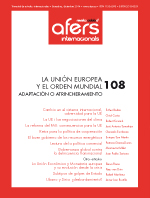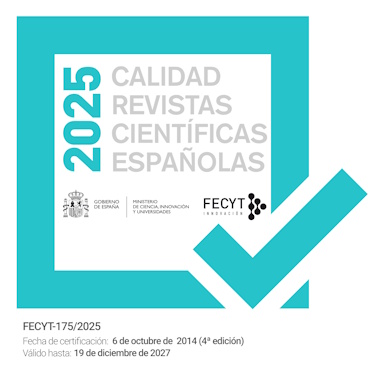Reading EU trade policy from a multilateral perspective
Keywords:
common trade policy, EU, WTO, multilateralism, bilateralismAbstract
Revista CIDOB d’Afers Internacionals, nº 108
Quadrimestral (September-December 2014)
ISSN:1133-6595 | E-ISSN:2013-035X
This article analyses whether the shift in EU trade strategy in the 21st century towards bilateralism is in conflict with its objective of promoting effective multilateralism. It demonstrates that the emergence of new powers in the trade sphere has produced a breach in the historical structure of international trade that puts the World Trade Organization’s capacity to achieve its mission of trade liberalisation at risk. Within this framework, EU bilateralism may be read differently depending on how the EU’s attitude to the BIC (Brazil, India, China) as new powers in the field of trade is interpreted. If it tends towards accommodation, its bilateralism may be read in a multilateralist light.
>> The full text articles of this issue are available only in Spanish language
References
Abbot, Frederick M. «A new dominant trade species emerges: is bilateralism a threat?». Journal of International Economic Law, vol. 10, n.º 3 (2007), p. 571-583.
Baldwin, Richard E. «Lessons from the European Spaghetti Bowl». Asian Development Bank Institute Working Paper Series, n.º 418 (2013), p. 1-13.
Baldwin, Richard E. «WTO 2.0: Global governance of supply-chain trade». Centre for Economic Policy Research Policy Insight, n.º 64 (2012), p. 1-24.
Baldwin, Richard E. «Multilateralising Regionalism: Spaghetti Bowls as Buiding Blocs on the Path to Global Free Trade». The World Economy, vol. 29, n.º 11 (2006), p. 1451-1518.
Baldwin, Richard E. «A Domino Theory of Regionalism». NBER Working Paper, n.º 4465 (1993), p. 1-38.
Baldwin, Richard y Evenett, Simon (eds.). Why World Leaders Must Resist the False Promise of Another Doha Delay. VoxEU.org eBook, 2011.
Bhagwati, Jagdish. Termites in the Trading System. Oxford: Oxford University Press, 2008.
Bhagwati, Jagdish. The World Trading System at Risk. Princeton: Princeton University Press, 1991.
Blackhurst, Richard y Hartridge, David. «Improving the capacity of WTO institutions to fulfil their mandate». Journal of International Economic Law, vol. 7, n.º 3 (2004), p. 705-716.
Comisión Europea. «Una Europea Global: Competir en el Mundo». COM (2006) 567 final.
Conceiçáo-Heldt, Eugénia da. «The Clash of Negotiations: The impact of Outside Options on Multilateral Trade Negotiations». International Negotiation, n.º 18 (2013), p. 111-130.
Damro, Chad. «Market power Europe». Journal of European Public Policy, vol. 13, n.º 6 (2006), p. 682-699.
De Ville, Ferdi y Orbie, Jan. «The European Union’s Trade Policy Response to the Crisis: Paradigm lost or reinforced?». European Integration online Papers, vol. 15, n.º 2 (2011), p. 1 22.
Ehlermann, Claus-Dieter y Ehring, Lothar. «Is the consensus practice of the World Trade Organization adequate for making, revising and implementing rules on international trade?». Journal of International Economic Law, vol. 8, n.º 1 (2005), p. 51-75.
Estevadeordal, Antoni; Suominen, Kati y Volpe, Christian. «Regional Trade Agreements, Development Challenges and Policy Options». The E15 Initiative: Strengthening the Multilateral Trading System. Regional Trade Agreements Group Proposals and Analysis (ICTSD and World Economic Forum), 2013, p. 7-27.
European Commission.«Trade, Growth and World Affairs. Trade Policy as a core component of the EU’s 2020 strategy». COM (2010) 612. (Esta comunicación no ha sido traducida al castellano).
Evenett, Simon J. «The failure of the WTO Ministerial Meeting in Cancun: Implications for Future Research». CESifo Forum, n.º 3 (2003), p. 11-17.
Garcia-Duran, Patricia; Kienzle, Benjamin y Millet, Montserrat. «Revisiting European influence: the case of agricultural trade negotiations». Journal of World Trade, vol. 48, n.º 5 (2014), p. 1057-1076.
Garcia-Duran, Patricia y Millet, Montserrat. «La Unión Europea en el comercio internacional», en: Barbé, Esther (dir.). La Unión Europea en las Relaciones Internacionales. Madrid: Tecnos, 2014.
Horn, Henrik; Mavroidis, Petros C. y Sapir, André. «Beyond the WTO? An anatomy of EU and US preferential trade agreements». Bruegel Blueprint Series, n.º 7 (2009), p. 1-65.
Lamy, Pascal. «La gran transformación del comercio internacional». Política Exterior, vol. 151 (mayo-junio 2013), p. 28-35.
Lawrence, Rovert Z. «When the immovable object meets the unstoppable force». The E15 Initiave: Strengthening the Multilateral Trading System. Regional Trade Agreements Group Proposals and Analysis (ICTSD and World Economic Forum), 2013, p. 39-42.
Meunier, Sophie. «Managing Globalization? The EU in International Trade Negotiations». Journal of Common Market Studies, vol. 45, n.º 4 (2007), p. 905-926.
Millet, Montserrat. «La regulación del comercio internacional: del GATT a la OMC». Colección de Estudios Económicos de la Caixa, n.º 24 (2001). Barcelona: la Caixa.
Millet, Montserrat; Garcia-Duran, Patricia y Casanova, M. Elisa. «La liberalización comercial de la UE con los países vecinos: ¿Un arma de doble filo?», en: Barbé, Esther (ed.). La Unión Europea más allá de sus fronteras: ¿Hacia la transformación del Mediterráneo y Europa Oriental? Madrid: Tecnos, 2010.
Narlikar, Amrita. «Collective Agency, Systemic Consequences: bargaining coalitions in the WTO», en: Narlikar, Amrita; Daunton, Martin y Stern, Robert M. (eds.). The Oxford Handbook on the World Trade Organization. Croydon: Oxford University Press, 2012, p. 184-209.
Narlikar, Amrita. «Adapting to new power balances: institutional reform in the WTO», en: Cottier, Thomas y Elsig, Manfred (eds.). Governing the World Trade Organization: Past, Present and Beyond Doha. Cambridge: Cambridge University Press, 2011a, p. 111-128.
Narlikar, Amrita. «The ministerial process and power dynamics in the World Trade Organization: understanding failure from Seattle to Cancún». New Political Economy, vol. 9, n.º 3 (2011b), p. 413-428.
Narlikar, Amrita. «New powers in the club: the challenges of global trade governance». International Affairs, vol. 86, n.º 3 (2010), p. 717-728.
Narlikar, Amrita y Tussie, Diana. «The G20 at the Cancun Ministerial: Developing Countries and Their Evolving Coalitions in the WTO». The World Economy, vol. 27 (2004), p. 947-966.
Organización Mundial del Comercio. «Informe sobre el Comercio Mundial 2011. La OMC y los acuerdos comerciales preferenciales: de la coexistencia a la coherencia». OMC.org (2011).
Sanahuja, José Antonio. «Narrativas del multilateralismo: “efecto Rashomon” y cambio de poder». Revista CIDOB d’Afers Internacionals, n.º 101 (2013), p. 27-54.
Schwab, Susan C. «After Doha: Why the Negotiations Are Doomed and What We Should Do About It». Foreign Affairs (May-June 2011).
Schott, Jeffrey J. y Watal, Jayashree. «Decision-making in the WTO». Peterson Institute for International Economics Policy Brief (March 2000).
Subramanian, Arvind y Kessler, Martin «The Hyperglobalization of Trade and Its Future». Peterson Institute for International Economics Working Paper, n.º 13-6 (2013), p. 1-66.
Van den Bossche, Peter y Alexovicová, Iveta. «Effective Global Economic Governance by the World Trade Organization». Journal of International Economic Law, vol. 8, n.º 3 (2005), p. 667-690.
Woolcock, Steven. European Union Economic Diplomacy: The Role of the EU in External Economic Relations. Farnham: Ashgate, 2012.
Woolcock, Steven. «European Union policy towards Free Trade Agreements». European Centre for International Political Economy (ECIPE) Working Paper, n.º 3 (2007).
WTO. «Transparency mechanism for regional trade agreements». Negotiating Group on Rules (Job(06)/59/Rev5), 2006.













